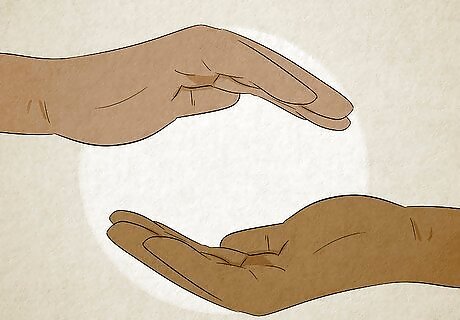
views
Communicate your needs.

Make sure you and your partner are always on the same page. As scary as it can be, being vulnerable with the person you want to share your life with is crucial. Start conversations about your hopes, fears, and expectations as often as you can. Just make sure you’re being respectful of their feelings and bringing things up at an appropriate time. For some ideas on how to start these conversations: “Hey, can we talk about…” “So I’ve been thinking, and…” “Is now a good time to talk?” “Can I get your opinion on something?”
Be an active listener.

Let your partner know that you care about their feelings. In addition to just talking about needs, it’s important for both people to really understand each other’s needs. Furthermore, each person should feel supported when they voice these needs. Give your friend these tips so they can be the best listener they can be: Focus on your partner and nothing else when they’re talking. Don’t think about how to respond or plan what to say next. Ask questions to make sure you’re both on the same page. Share your own thoughts or feelings when you can relate.
Echo your partner’s thoughts and feelings.

Repeat after your partner to prove you’re listening. Another practice that can accompany active listening is saying what your partner says back to them during serious conversations. Try rephrasing what they say or asking questions to prove that you’re invested and paying close attention. For example: “I think we’re spending too much money on going out.” “What I’m hearing is we should save money by staying in more often, right?” “I feel like I do everything around the house.” “You feel like you do all the chores and we should split them more evenly?”
Try new things together.

Share first-time experiences to keep things fresh. Couples who regularly try doing new activities together tend to have more fun together than those who stick to what they know. This is a great way for people in love to constantly keep things new and exciting, and create memories together to strengthen their bond. For example, try taking an art or cooking class together. Or, take your next vacation somewhere neither of you have ever been.
Keep the romance alive.

Show your partner you’re thinking of them with gifts and dates. Over time, couples settle into routine and the initial excitement of a relationship might begin to fade. Don’t let this stop you from doing something unexpected every once in a while! Every month or so, surprise your partner with something heartfelt and personal. For example: Buy a small gift that’s specific to your partner’s hobbies or interests. Secretly plan an out-of-the-box date, like a concert or weekend trip.
Be generous.

Demonstrate your love by showing it in your actions. Going out of your way to support and care for your partner is a choice that can make or break a successful relationship. Be prepared for these acts of kindness to be inconvenient to you sometimes, too. Some of these selfless gestures include: Cooking meals. Washing dishes. Doing laundry. Giving rides. Bringing food or coffee.
Make time for intimacy.

Communicate your sexual needs so you’re both satisfied. Frequent, small forms of touch, like kissing, hugging, and holding hands, are definitely important to keeping a couple strong. But so is sex! Keep physical intimacy consistent and alive, in whatever capacity you can. For some tips on how to go about doing that: Talk to each other about what you like and don’t like doing. Try scheduling time for sex or cuddling if you’re busy. Commit to it, even when you’re tired or not in the mood.
Argue constructively.

Remain a team by fighting the issue and not each other. Conflict is an inevitable part of any long-term relationship. It’s perfectly normal and healthy to disagree with each other on things. However, when these issues arise, it’s important that a couple stays respectful of each other. Here’s some food for thought when it comes to having arguments: Give yourself time to cool off before talking, if you can. Talk about the current issue, and don’t bring up past incidents. Avoid criticism or judgment of your partner’s character. Use “I” statements, like “I feel,” to avoid projecting motives. Take responsibility for your own mistakes. Acknowledge that not every issue can be fixed.
Give and take.

Make compromises so you’re both happy with decisions. There will be times in a relationship when a choice needs to be made, but both parties are split on what to do. In order to keep both sides happy, you might need to make a new decision that appeases everyone. Making small sacrifices once in a while is part of the game! For example: If you want to eat out but your partner wants to eat at home, get takeout. Or, decide to make food at home for this meal, and eat out tomorrow. If you want a dog but your partner is allergic, get a cat. Or, hold off on getting a pet for now.
Maintain your other relationships.

Spend time with friends and family so you don’t lose touch. Even though your partner might seem like the only person in your life at times, it’s crucial to interact with other people, too. Developing relationships of different kinds fulfills needs that a single person might not be able to give you. Don’t forget to devote time and energy to your friends and family. This will also put less pressure on your partner to be your “everything.” In turn, this will make the time you do spend together more special.
Prepare for ups and downs together.

Don’t allow the unexpected to get in the way of your love. Throughout the life of this relationship, a lot of circumstances will change. Health complications, job losses, or deaths of loved ones might cause a huge stress on the relationship. It’s crucial that you support yourself and your partner through these major life changes. To deal with these issues sensitively: Take frustration out on something other than each other. Work as a team to find a solution. There might not always be one. Communicate and adapt to new circumstances together. Remember high points in the relationship. This isn’t forever. Seek outside help from a friend or professional if you need it.



















Comments
0 comment